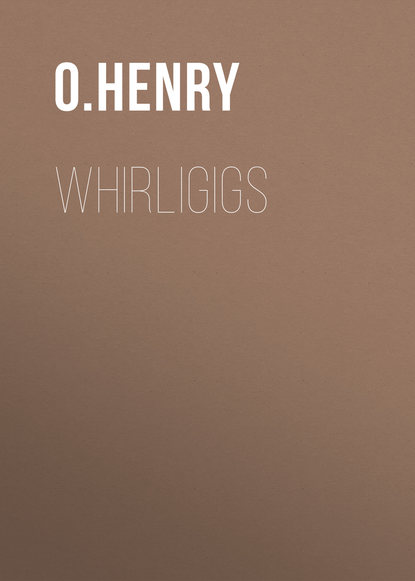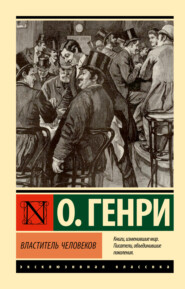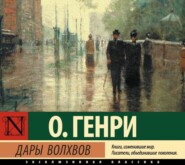По всем вопросам обращайтесь на: info@litportal.ru
(©) 2003-2025.
✖
Whirligigs
Настройки чтения
Размер шрифта
Высота строк
Поля
"You handle," continued the visitor, "all the various ramifications of busted-up connubiality. You are a surgeon, we might saw, who extracts Cupid's darts when he shoots 'em into the wrong parties. You furnish patent, incandescent lights for premises where the torch of Hymen has burned so low you can't light a cigar at it. Am I right, Mr. Gooch?"
"I have undertaken cases," said the lawyer, guardedly, "in the line to which your figurative speech seems to refer. Do you wish to consult me professionally, Mr. –" The lawyer paused, with significance.
"Not yet," said the other, with an arch wave of his cigar, "not just yet. Let us approach the subject with the caution that should have been used in the original act that makes this pow-wow necessary. There exists a matrimonial jumble to be straightened out. But before I give you names I want your honest – well, anyhow, your professional opinion on the merits of the mix-up. I want you to size up the catastrophe – abstractly – you understand? I'm Mr. Nobody; and I've got a story to tell you. Then you say what's what. Do you get my wireless?"
"You want to state a hypothetical case?" suggested Lawyer Gooch.
"That's the word I was after. 'Apothecary' was the best shot I could make at it in my mind. The hypothetical goes. I'll state the case. Suppose there's a woman – a deuced fine-looking woman – who has run away from her husband and home? She's badly mashed on another man who went to her town to work up some real estate business. Now, we may as well call this woman's husband Thomas R. Billings, for that's his name. I'm giving you straight tips on the cognomens. The Lothario chap is Henry K. Jessup. The Billingses lived in a little town called Susanville – a good many miles from here. Now, Jessup leaves Susanville two weeks ago. The next day Mrs. Billings follows him. She's dead gone on this man Jessup; you can bet your law library on that."
Lawyer Gooch's client said this with such unctuous satisfaction that even the callous lawyer experienced a slight ripple of repulsion. He now saw clearly in his fatuous visitor the conceit of the lady-killer, the egoistic complacency of the successful trifler.
"Now," continued the visitor, "suppose this Mrs. Billings wasn't happy at home? We'll say she and her husband didn't gee worth a cent. They've got incompatibility to burn. The things she likes, Billings wouldn't have as a gift with trading-stamps. It's Tabby and Rover with them all the time. She's an educated woman in science and culture, and she reads things out loud at meetings. Billings is not on. He don't appreciate progress and obelisks and ethics, and things of that sort. Old Billings is simply a blink when it comes to such things. The lady is out and out above his class. Now, lawyer, don't it look like a fair equalization of rights and wrongs that a woman like that should be allowed to throw down Billings and take the man that can appreciate her?
"Incompatibility," said Lawyer Gooch, "is undoubtedly the source of much marital discord and unhappiness. Where it is positively proved, divorce would seem to be the equitable remedy. Are you – excuse me – is this man Jessup one to whom the lady may safely trust her future?"
"Oh, you can bet on Jessup," said the client, with a confident wag of his head. "Jessup's all right. He'll do the square thing. Why, he left Susanville just to keep people from talking about Mrs. Billings. But she followed him up, and now, of course, he'll stick to her. When she gets a divorce, all legal and proper, Jessup will do the proper thing."
"And now," said Lawyer Gooch, "continuing the hypothesis, if you prefer, and supposing that my services should be desired in the case, what – "
The client rose impulsively to his feet.
"Oh, dang the hypothetical business," he exclaimed, impatiently. "Let's let her drop, and get down to straight talk. You ought to know who I am by this time. I want that woman to have her divorce. I'll pay for it. The day you set Mrs. Billings free I'll pay you five hundred dollars."
Lawyer Gooch's client banged his fist upon the table to punctuate his generosity.
"If that is the case – " began the lawyer.
"Lady to see you, sir," bawled Archibald, bouncing in from his anteroom. He had orders to always announce immediately any client that might come. There was no sense in turning business away.
Lawyer Gooch took client number one by the arm and led him suavely into one of the adjoining rooms. "Favour me by remaining here a few minutes, sir," said he. "I will return and resume our consultation with the least possible delay. I am rather expecting a visit from a very wealthy old lady in connection with a will. I will not keep you waiting long."
The breezy gentleman seated himself with obliging acquiescence, and took up a magazine. The lawyer returned to the middle office, carefully closing behind him the connecting door.
"Show the lady in, Archibald," he said to the office boy, who was awaiting the order.
A tall lady, of commanding presence and sternly handsome, entered the room. She wore robes – robes; not clothes – ample and fluent. In her eye could be perceived the lambent flame of genius and soul. In her hand was a green bag of the capacity of a bushel, and an umbrella that also seemed to wear a robe, ample and fluent. She accepted a chair.
"Are you Mr. Phineas C. Gooch, the lawyer?" she asked, in formal and unconciliatory tones.
"I am," answered Lawyer Gooch, without circumlocution. He never circumlocuted when dealing with a woman. Women circumlocute. Time is wasted when both sides in debate employ the same tactics.
"As a lawyer, sir," began the lady, "you may have acquired some knowledge of the human heart. Do you believe that the pusillanimous and petty conventions of our artificial social life should stand as an obstacle in the way of a noble and affectionate heart when it finds its true mate among the miserable and worthless wretches in the world that are called men?"
"Madam," said Lawyer Gooch, in the tone that he used in curbing his female clients, "this is an office for conducting the practice of law. I am a lawyer, not a philosopher, nor the editor of an 'Answers to the Lovelorn' column of a newspaper. I have other clients waiting. I will ask you kindly to come to the point."
"Well, you needn't get so stiff around the gills about it," said the lady, with a snap of her luminous eyes and a startling gyration of her umbrella. "Business is what I've come for. I want your opinion in the matter of a suit for divorce, as the vulgar would call it, but which is really only the readjustment of the false and ignoble conditions that the short-sighted laws of man have interposed between a loving – "
"I beg your pardon, madam," interrupted Lawyer Gooch, with some impatience, "for reminding you again that this is a law office. Perhaps Mrs. Wilcox – "
"Mrs. Wilcox is all right," cut in the lady, with a hint of asperity. "And so are Tolstoi, and Mrs. Gertrude Atherton, and Omar Khayyam, and Mr. Edward Bok. I've read 'em all. I would like to discuss with you the divine right of the soul as opposed to the freedom-destroying restrictions of a bigoted and narrow-minded society. But I will proceed to business. I would prefer to lay the matter before you in an impersonal way until you pass upon its merits. That is to describe it as a supposable instance, without – "
"You wish to state a hypothetical case?" said Lawyer Gooch.
"I was going to say that," said the lady, sharply. "Now, suppose there is a woman who is all soul and heart and aspirations for a complete existence. This woman has a husband who is far below her in intellect, in taste – in everything. Bah! he is a brute. He despises literature. He sneers at the lofty thoughts of the world's great thinkers. He thinks only of real estate and such sordid things. He is no mate for a woman with soul. We will say that this unfortunate wife one day meets with her ideal – a man with brain and heart and force. She loves him. Although this man feels the thrill of a new-found affinity he is too noble, too honourable to declare himself. He flies from the presence of his beloved. She flies after him, trampling, with superb indifference, upon the fetters with which an unenlightened social system would bind her. Now, what will a divorce cost? Eliza Ann Timmins, the poetess of Sycamore Gap, got one for three hundred and forty dollars. Can I – I mean can this lady I speak of get one that cheap?"
"Madam," said Lawyer Gooch, "your last two or three sentences delight me with their intelligence and clearness. Can we not now abandon the hypothetical and come down to names and business?"
"I should say so," exclaimed the lady, adopting the practical with admirable readiness. "Thomas R. Billings is the name of the low brute who stands between the happiness of his legal – his legal, but not his spiritual – wife and Henry K. Jessup, the noble man whom nature intended for her mate. I," concluded the client, with an air of dramatic revelation, "am Mrs. Billings!"
"Gentlemen to see you, sir," shouted Archibald, invading the room almost at a handspring. Lawyer Gooch arose from his chair.
"Mrs. Billings," he said courteously, "allow me to conduct you into the adjoining office apartment for a few minutes. I am expecting a very wealthy old gentleman on business connected with a will. In a very short while I will join you, and continue our consultation."
With his accustomed chivalrous manner, Lawyer Gooch ushered his soulful client into the remaining unoccupied room, and came out, closing the door with circumspection.
The next visitor introduced by Archibald was a thin, nervous, irritable-looking man of middle age, with a worried and apprehensive expression of countenance. He carried in one hand a small satchel, which he set down upon the floor beside the chair which the lawyer placed for him. His clothing was of good quality, but it was worn without regard to neatness or style, and appeared to be covered with the dust of travel.
"You make a specialty of divorce cases," he said, in, an agitated but business-like tone.
"I may say," began Lawyer Gooch, "that my practice has not altogether avoided – "
"I know you do," interrupted client number three. "You needn't tell me. I've heard all about you. I have a case to lay before you without necessarily disclosing any connection that I might have with it – that is – "
"You wish," said Lawyer Gooch, "to state a hypothetical case.
"You may call it that. I am a plain man of business. I will be as brief as possible. We will first take up hypothetical woman. We will say she is married uncongenially. In many ways she is a superior woman. Physically she is considered to be handsome. She is devoted to what she calls literature – poetry and prose, and such stuff. Her husband is a plain man in the business walks of life. Their home has not been happy, although the husband has tried to make it so. Some time ago a man – a stranger – came to the peaceful town in which they lived and engaged in some real estate operations. This woman met him, and became unaccountably infatuated with him. Her attentions became so open that the man felt the community to be no safe place for him, so he left it. She abandoned husband and home, and followed him. She forsook her home, where she was provided with every comfort, to follow this man who had inspired her with such a strange affection. Is there anything more to be deplored," concluded the client, in a trembling voice, "than the wrecking of a home by a woman's uncalculating folly?"
Lawyer Gooch delivered the cautious opinion that there was not.
"This man she has gone to join," resumed the visitor, "is not the man to make her happy. It is a wild and foolish self-deception that makes her think he will. Her husband, in spite of their many disagreements, is the only one capable of dealing with her sensitive and peculiar nature. But this she does not realize now."
"Would you consider a divorce the logical cure in the case you present?" asked Lawyer Gooch, who felt that the conversation was wandering too far from the field of business.
"A divorce!" exclaimed the client, feelingly – almost tearfully. "No, no – not that. I have read, Mr. Gooch, of many instances where your sympathy and kindly interest led you to act as a mediator between estranged husband and wife, and brought them together again. Let us drop the hypothetical case – I need conceal no longer that it is I who am the sufferer in this sad affair – the names you shall have – Thomas R. Billings and wife – and Henry K. Jessup, the man with whom she is infatuated."
Client number three laid his hand upon Mr. Gooch's arm. Deep emotion was written upon his careworn face. "For Heaven's sake", he said fervently, "help me in this hour of trouble. Seek out Mrs. Billings, and persuade her to abandon this distressing pursuit of her lamentable folly. Tell her, Mr. Gooch, that her husband is willing to receive her back to his heart and home – promise her anything that will induce her to return. I have heard of your success in these matters. Mrs. Billings cannot be very far away. I am worn out with travel and weariness. Twice during the pursuit I saw her, but various circumstances prevented our having an interview. Will you undertake this mission for me, Mr. Gooch, and earn my everlasting gratitude?"
"It is true," said Lawyer Gooch, frowning slightly at the other's last words, but immediately calling up an expression of virtuous benevolence, "that on a number of occasions I have been successful in persuading couples who sought the severing of their matrimonial bonds to think better of their rash intentions and return to their homes reconciled. But I assure you that the work is often exceedingly difficult. The amount of argument, perseverance, and, if I may be allowed to say it, eloquence that it requires would astonish you. But this is a case in which my sympathies would be wholly enlisted. I feel deeply for you sir, and I would be most happy to see husband and wife reunited. But my time," concluded the lawyer, looking at his watch as if suddenly reminded of the fact, "is valuable."
"I am aware of that," said the client, "and if you will take the case and persuade Mrs. Billings to return home and leave the man alone that she is following – on that day I will pay you the sum of one thousand dollars. I have made a little money in real estate during the recent boom in Susanville, and I will not begrudge that amount."
"Retain your seat for a few moments, please," said Lawyer Gooch, arising, and again consulting his watch. "I have another client waiting in an adjoining room whom I had very nearly forgotten. I will return in the briefest possible space."
The situation was now one that fully satisfied Lawyer Gooch's love of intricacy and complication. He revelled in cases that presented such subtle problems and possibilities. It pleased him to think that he was master of the happiness and fate of the three individuals who sat, unconscious of one another's presence, within his reach. His old figure of the ship glided into his mind. But now the figure failed, for to have filled every compartment of an actual vessel would have been to endanger her safety; with his compartments full, his ship of affairs could but sail on to the advantageous port of a fine, fat fee. The thing for him to do, of course, was to wring the best bargain he could from some one of his anxious cargo.
First he called to the office boy: "Lock the outer door, Archibald, and admit no one." Then he moved, with long, silent strides into the room in which client number one waited. That gentleman sat, patiently scanning the pictures in the magazine, with a cigar in his mouth and his feet upon a table.
"Well," he remarked, cheerfully, as the lawyer entered, "have you made up your mind? Does five hundred dollars go for getting the fair lady a divorce?"

















